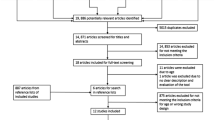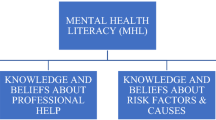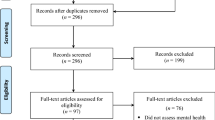Abstract
Approximately one in five children will have a mental health disorder at some point in their lifetime (Merikangas et al. Pediatrics 125:75–81, 2010). Despite this prevalence, many children are uninformed and unaware of how to recognize and manage mental health disorders. Previous efforts to increase mental health literacy focused on adults, not children. The purpose of this article is to begin filling this gap by utilizing a survey to describe children’s mental health providers’ perceptions of the amount, accuracy, and origin of mental health literacy in the children and adolescents they treat and how mental health literacy impacts their work. Eighty-seven mental health providers completed an online survey to explore perceptions of children’s mental health literacy. Per providers’ reports, results demonstrate that children’s mental health literacy is low, inaccurate, and inconsistent. Consistent with previous research, providers reported that children primarily rely on friends and peers for information about mental health disorders, with family as a close second. Implications of these findings for social work practitioners, researchers, and children are discussed.

Similar content being viewed by others
References
American Psychiatric Association. (2000). Diagnostic and statistical manual of mental disorders (4th ed.). Washington, DC: American Psychiatric Association.
Boxer, P., & Tisak, M. (2003). Adolescents’ attributions about aggression: An initial investigation. Journal of Adolescence, 26, 559–573.
Burns, J. R., & Rapee, R. M. (2006). Adolescent mental health literacy: Young people’s knowledge of depression and help seeking. Journal of Adolescence, 29(2), 225–239.
Cotton, S. M., Wright, A., Harris, M. G., Jorm, A. F., & McGorry, P. D. (2006). Influence of gender on mental health literacy in young Australians. Australian and New Zealand Journal of Psychiatry, 40(9), 790–796.
Hennessy, E., Swords, L., & Heary, C. (2008). Children’s understanding of psychological problems displayed by their peers: A review of the literature. Child: Care, Health and Development, 34, 4–9.
Jorm, A. F., Korten, A. E., Jacomb, P. A., Christensen, H., Rodgers, B., & Pollitt, P. (1997). “Mental health literacy”: A survey of the public’s ability to recognize mental disorders and their beliefs about the effectiveness of treatment. Medical Journal of Australia, 166, 182.
Jorm, A. F., Morgan, A. J., & Wright, A. (2008). Interventions that are helpful for depression and anxiety in young people: A comparison of clinicians’ beliefs with those of youth and their parents. Journal of Affective Disorders, 111(2/3), 227–234.
Jorm, A. F., Morgan, A. J., & Wright, A. (2010). Actions that young people can take to prevent depression, anxiety and psychosis: Beliefs of health professionals and young people. Journal of Affective Disorders, 126, 278–281.
Jorm, A. F., & Wright, A. (2007). Beliefs of young people and their parents about the effectiveness of interventions for mental disorders. Australian and New Zealand Journal of Psychiatry, 41, 656–666.
Jorm, A. F., Wright, A., & Morgan, A. J. (2007). Beliefs about appropriate first aid for young people with mental disorders: Findings from an Australian national survey of youth and parents. Early Intervention Psychiatry, 1, 61–70.
Kelly, C. M., Jorm, A. F., & Rodgers, B. (2006). Adolescents’ responses to peers with depression or conduct disorder. Australian and New Zealand Journal of Psychiatry, 40(63), 63–66.
Kessler, R. C., Amminger, G. P., Aguilar-Gaxiola, S., Alonso, J., Lee, S., & Ustun, T. B. (2007). Age of onset of mental disorders: A review of recent literature. Current Opinion Psychiatry, 20(4), 359–364.
Leighton, S. (2010). Using a vignette-based questionnaire to explore adolescents’ understanding of mental health issues. Clinical Child Psychology and Psychiatry, 15(2), 231–250.
Merikangas, K. R., He, J. P., Brody, D., Fisher, P. W., Bourdon, K., & Koretz, D. S. (2010). Prevalence and treatment of mental disorders among US children in the 2001–2004 NHANES. Pediatrics, 125(1), 75–81.
National Institute of Mental Health. (2005). Mental illness exacts heavy toll, beginning in youth. Retrieved from http://www.nimh.nih.gov/science-news/2005/mental-illness-exacts-heavy-toll-beginning-in-youth.shtml.
Oh, W., Jorm, A. F., & Wright, A. (2009). Perceived helpfulness of websites for mental health information: A national survey of young Australians. Social Psychiatry and Psychiatric Epidemiology, 44(4), 293–299.
Olsson, D. P., & Kennedy, M. G. (2010). Mental health literacy among young people in a small US town: Recognition of disorders and hypothetical helping responses. Early Intervention in Psychiatry, 4(4), 291–298.
Pinto-Foltz, M. D., Logsdon, M. C., & Myers, J. A. (2011). Feasibility, acceptability, and initial efficacy of a knowledge-contact program to reduce mental illness stigma and improve mental health literacy in adolescents. Social Science and Medicine, 72, 2011–2019.
Rickwood, D., Deane, F. P., Wilson, C. J., & Ciarrochi, J. (2005). Young people’s help-seeking for mental health problems. Advances in Mental Health, 4(3), 218–251.
Schacter, H. M., Giradi, A., Ly, M., Lacroix, D., Lumb, A. B., van Berkom, J., et al. (2008). Effects of school-based interventions on mental health stigmatization: A systematic review. Child and Adolescent Psychiatry and Mental Health, 2, 18.
Swords, L., Hennessy, E., & Heary, C. (2011). Adolescents’ beliefs about sources of help for ADHD and depression. Journal of Adolescence, 34(3), 485–492.
Wahl, O., Susin, J., Lax, A., Kaplan, L., & Zatina, D. (2012). Knowledge and attitudes about mental illness: A survey of middle school students. Psychiatric Services, 63(7), 649–654.
Wisdom, J. P., & Agnor, C. (2007). Family heritage and depression guides: Family and peer views influence adolescent attitudes about depression. Journal of Adolescence, 30(2), 333–346.
Wright, A., Harris, M. G., Wiggers, J. H., Jorm, A. F., Cotton, S. M., & McGorry, P. D. (2005). Recognition of depression and psychosis by young Australians and their beliefs about treatment. Medical Journal of Australia, 183, 18–23.
Acknowledgments
This research was supported by a Grant from the University of Kansas New Faculty General Research Fund.
Author information
Authors and Affiliations
Corresponding author
Rights and permissions
About this article
Cite this article
Mendenhall, A.N., Frauenholtz, S. & Conrad-Hiebner, A. Provider Perceptions of Mental Health Literacy Among Youth. Child Adolesc Soc Work J 31, 281–293 (2014). https://doi.org/10.1007/s10560-013-0321-5
Published:
Issue Date:
DOI: https://doi.org/10.1007/s10560-013-0321-5




